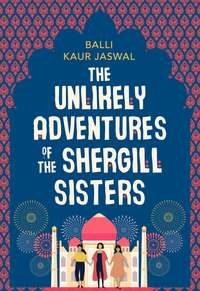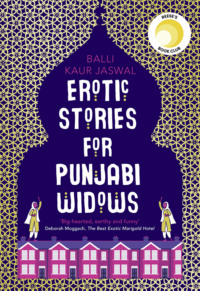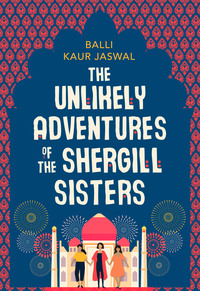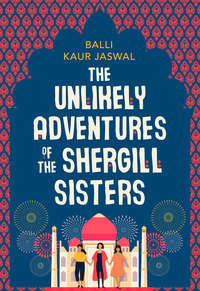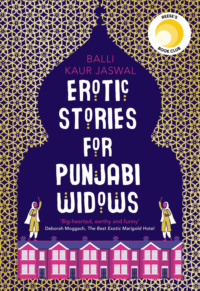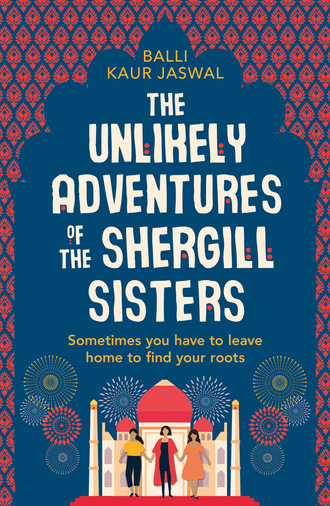
Полная версия
The Unlikely Adventures of the Shergill Sisters



Copyright
Published by HarperCollinsPublishers Ltd
1 London Bridge Street
London SE1 9GF
www.harpercollins.co.uk
First published in Great Britain by HarperCollinsPublishers 2019
Copyright © Balli Kaur Jaswal 2019
Jacket design: Holly MacDonald © HarperCollinsPublishers Ltd 2019
Jacket illustration © Shutterstock.com
Balli Kaur Jaswal asserts the moral right to be identified as the author of this work.
A catalogue copy of this book is available from the British Library.
This novel is entirely a work of fiction. The names, characters and incidents portrayed in it are the work of the author’s imagination. Any resemblance to actual persons, living or dead, events or localities is entirely coincidental.
All rights reserved under International and Pan-American Copyright Conventions. By payment of the required fees, you have been granted the non-exclusive, non-transferable right to access and read the text of this e-book on screen. No part of this text may be reproduced, transmitted, down-loaded, decompiled, reverse engineered, or stored in or introduced into any information storage and retrieval system, in any form or by any means, whether electronic or mechanical, now known or hereinafter invented, without the express written permission of HarperCollins.
Source ISBN: 9780008209933
Ebook Edition © June 2019 ISBN: 9780008209957
Version: 2020-05-18
Dedication
For Asher
Contents
Cover
Title Page
Copyright
Dedication
Prologue
Chapter One
Chapter Two
Chapter Three
Chapter Four
Chapter Five
Chapter Six
Chapter Seven
Chapter Eight
Chapter Nine
Chapter Ten
Chapter Eleven
Chapter Twelve
Chapter Thirteen
Chapter Fourteen
Chapter Fifteen
Chapter Sixteen
Chapter Seventeen
Chapter Eighteen
Chapter Nineteen
Chapter Twenty
Chapter Twenty-One
Chapter Twenty-Two
Chapter Twenty-Three
Chapter Twenty-Four
Chapter Twenty-Five
Epilogue
Acknowledgements
About the Author
Also by Balli Kaur Jaswal
About the Publisher
Prologue
My dearest children,
If you are reading this, you know the end has finally come for me. I hope that our final moments together were peaceful and that I had a chance to tell each of you how much I love you. If not, I hope that you know how much you have enriched my life. I am so very proud of each of you and the individual paths you have trekked in this world. I am blessed to have been witness to your triumphs and challenges, your heartaches and your successes. Guiding you from infancy to adulthood allowed me to live life over and over again, and in this way, I feel that I have stepped into so many worlds in the course of my brief stay in this universe.
There are matters to be discussed of course, involving the will and my estate, but these will come later. I trust that the lawyers will discuss the inheritance and the division of property and assets with you after the other formalities are taken care of. If you would like to be informed ahead of time, please see the attached.
Please take care of yourselves and each other. Make time, not just on special occasions, to come together and enrich your bond as a family. I have learned that the most important thing in life is that we show appreciation to our loved ones. Remember that nothing matters more than this.
This was the letter that Sita Kaur Shergill overheard the old woman in the next bed dictating over the phone. A few times, her voice quavered and she had to pause to sigh and sniffle. Sita had turned down the volume on her television to listen to the part about the lawyers – she was most interested in what this woman was leaving to her children, but ‘the attached’ was not available on this side of the partition. She had seen the children on their visits – two middle-aged sons who were possibly twins with vastly different diets and a handsome blonde woman who always repeated the same soothing words, ‘We’re here, Mum. We’re here.’ They often arrived separately but left together, squeezing each other’s shoulders and making light conversation about parking spaces or the declining quality of the hospital canteen’s coffee.
Sita pressed the buzzer on her remote control and when the nurse arrived, she requested a pen and piece of paper. These were the earliest hours of the morning, before visitors were allowed. It was the best time to think about dying. The pain encompassed her entire body, radiating from her toes to her temples and vibrating in her bones. Despite the morphine, the pain was always visible – she saw it edging in the shadows of her vision on the best days and wringing her frail body like a towel on the worst. Today she was feeling strong enough to sit up; the letter from the woman in the next bed had motivated her, and by some miracle, the nurses attended to her request within the minute.
My dearest daughters, she began. She stopped and frowned. When had she ever addressed her children as dears? She crossed out the line and began again. To Rajni, Jezmeen and Shirina. There – a command for their attention. She used to stand at the foot of the stairs and shout all three names even if she only wanted one of them to come down; she could always find something for the other two to do once they arrived. It only worked for a while, then Jezmeen started calling back: ‘WHICH ONE OF US SPECIFICALLY?’
To Rajni, Jezmeen and Shirina:
By now, I am dead. It is just as well because I’ve had enough of this ghastly life – all this working and suffering and trying to take care of myself for no bloody reason. Please enjoy your health while you have it because once your body betrays you, no comforts in the world will make up for your loss.
No, she couldn’t leave them with that. It was too honest. If these were her last words, they’d never forgive her. She folded the sheet and set it on her side table, weighing it down with the pen, and then she closed her eyes. How did she want to be remembered? She had been a wife, a mother, a widow and a grandmother. Sikh funerals didn’t include eulogies, so her daughters would be spared the task of scraping together a list of her meagre achievements. On some days, she thought she knew which of her daughters would remember her least kindly and on better days, she assured herself that all of them would at least agree that she had tried her very best.
Sita pressed the button to call for the nurse again. It took a while this time, but eventually the rail-thin girl with the tattoos and half her head shaved arrived. She was not as friendly as the Jamaican nurse who sometimes squeezed Sita’s hand and said, ‘You rest now,’ but she smiled when Sita asked her: ‘How old are you?’
‘I’m twenty-seven,’ she replied. There were zig-zag patterns shaved into the sides of the girl’s scalp. Sita wondered what man found this sort of thing attractive.
‘Have you ever been to India?’ she asked.
‘No,’ the nurse said, a bit regretfully, which pleased Sita.
‘If your mother asked you to do something for her, no matter what it was, would you do it?’ she asked.
The nurse slid Sita’s table down the bed so she could tug at the edge of the blanket, which was bunched up by her feet. Her fingers grazed the knuckles of Sita’s toes. ‘Of course I would,’ she said. ‘Now, is there something you need, because—’
‘What’s your religion?’ Sita asked.
Her question was met with narrowed eyes. ‘I do believe that’s a very personal question to ask.’
Sita frowned. There was a reason she liked the Jamaican nurse better. She wore a thin gold cross that hung just beneath the V-neck of her scrubs. ‘Ho, Lord,’ she wheezed quietly, stretching her back at the end of a long shift.
‘Can you hand me my pen and paper, please?’ Sita asked. As the girl reached into the drawer next to the bed, Sita’s heart leapt into her throat. Not there!
‘It’s right there, on the table,’ Sita snapped, pointing at the table, now out of her reach. Although the nurse was unlikely to pluck Sita’s jewellery pouch from where it was nestled between a prayer book and her mobile phone charger, Sita had lived long enough to know that you could never be too careful. The girl moved the table back and then left, probably to grumble and tell the other nurses that they were right, old Mrs Shergill needed to cark it already. Last week, Rajni had stormed into the nurses’ station and told them off for leaving Sita shivering during a particularly agonizing episode. ‘I don’t care if she’s already got a blanket, get her another one,’ Rajni nearly shouted, making Sita want to weep with gratitude and also chastise her daughter for making a scene.
The pain was inching into her body now, and she could sense that it was going to be a bad day. Her daughters would visit this afternoon – hopefully all three of them, since Rajni had called Shirina and informed her to fly over at once when it appeared that Sita’s remaining days were down to single digits. She had to write this letter before the strength leached out of her.
To Rajni, Jezmeen and Shirina:
If you remember correctly, when I was first diagnosed with cancer, I wanted to go to India to do a pilgrimage to honour the principles of our great Gurus. You and the doctors convinced me that this was a bad idea because my health was already so fragile, but I think it would have enriched my spirit, if not my physical condition.
I am attaching a list of the places that I would like you to visit on my behalf, after I am gone. They are in Delhi, Amritsar and beyond. The whole journey will take a week. You should go together and do all the tasks as instructed: seva, to serve others and preserve your humility; a ritual sarovar bath, for cleansing and protecting your soul from ailments; and a trek to the high peaks of spirituality, to feel appreciation for that body which carries you in this life. I would also like my ashes to be scattered in India.
There are also some places I’d like you to visit because I won’t have the chance to do so. Simple pleasures, like watching the sunrise at India Gate, and sharing a humble dinner together. I will outline the itinerary in more detail on the next page. Please do this for me. It will be a way of completing my journey in this world and continuing yours.
Love,
Your mother, Sita Kaur Shergill.
Sita’s vision began to blur as she read over the letter. There it was, the searing sensation in her bones. She squeezed her eyes shut and clutched the sides of her mattress. There was only so much morphine the nurses could administer in a day and no legal dose seemed to be enough to wash it all away. ‘We’re here, Mum, we’re here,’ she imagined her daughters saying, just like the blonde woman, as she presented the letter to them. Their faces would be awash with tears and they would take each other’s hands, united for once.
As the wave of pain subsided, Sita picked up her pen again and turned over the sheet to work on the itinerary. Agony was quickly replaced by nostalgia – Sita’s memories of India were stronger than ever. An end-of-life counsellor named Russ who visited last week said that it was common to remember the past vividly as death approached. ‘Think of it as a transition,’ Russ had said. ‘You are finishing one stage and entering another.’ Recalling those words, Sita considered her daughters’ journey to India. She would insist that they do this – no excuses, no backing out. It was a comfort to know that while they returned to her origins, she would be busy entering the afterlife. Who knew how long it would take to adjust to her new surroundings there, make friends, find out how the coffee machine worked? What if Devinder had also ended up in this new place? She had decades of catching up to do with her late husband, after she’d finished telling him off for leaving so suddenly.
Thoughts and memories of those early years of marriage and having children flooded Sita’s mind, reducing all remaining traces of pain to a dull ache that settled in her chest. Those were chaotic days – learning to be a wife and a mother, running a household and adjusting to life in a new country. When she finally got the hang of it all, her husband died. There was only a small fraction of Sita’s lifespan when her family was whole. She scribbled more items onto the itinerary. Her last trip to India had been nearly thirty years ago. In his explanation of the stages of grief, Russ had said that some people experienced an intense desire to turn back time. Although Sita prided herself on being too pragmatic for such wishes, she also hoped that her daughters found India just as she had left it.
There was something else Sita wanted to tell her daughters. It was a confession of sorts, for something she made up her mind to do after Russ left her bedside. She would have to find a suitable moment to tell them. It was not appropriate to write it down; she’d have to lower her voice and prompt her daughters to gather closer. They’d dismiss her at first, of course. ‘Mum, don’t be silly,’ Rajni or Shirina would say. ‘You’re kidding, right?’ Jezmeen would retort, because to Jezmeen, nothing was real, not even on a woman’s deathbed. Then they’d begin to protest, telling her she didn’t know what she was saying. That was by far the most frustrating thing about being terminally ill – everybody thought she was thinking through a haze of fear, a desperate need to cling to life. But death was the most certain thing in the world. To prove to her daughters that she was indeed being serious, she’d tell them to open the drawer and take out the jewellery pouch. Have a look inside. You see? Now, please don’t argue with your mother.
Chapter One
I would prefer that you take this journey during a cooler time of the year, but since Rajni can only travel during school holidays, you will need to go to India in July/August. Book your tickets and hotels quickly – I know my last trip to India was well over twenty years ago, but the last-minute bookings were very expensive.
Rajni was not built for fainting spells. Moments after Anil told her about the girlfriend, she considered pretending to faint, but she knew she’d throw her arms out at the last minute to break the fall. Nobody took a woman seriously if she staged her own collapses. A feigned faint, ha-ha.
So she stared at Anil as simple mathematical sums populated her mind:
36 – 18 = 18
The girlfriend was 18 years older than Anil.
36 ÷ 18 = 2
The girlfriend was exactly twice Anil’s age.
43 – 36 = 7
The girlfriend was only seven years younger than Rajni herself.
This last fact made her light-headed. The overpowering smell of half-eaten fish wasn’t helping. For dinner, she had baked three pieces of salmon because Omega Threes were supposed to make everybody live to a hundred. This girlfriend of Anil’s, did she know about the nutritional benefits of Omega Threes? Probably not.
‘Mum, come on,’ said Anil. All Rajni could do was shake her head. No, no, no. Tonight was supposed to be special: their last dinner together before she went off to India. If Anil had chosen this occasion to tell them about his girlfriend, then she was supposed to be … well, a girl. Somebody who called her Mrs Chadha and whose parents regarded Anil with a reasonable amount of suspicion until he won them over with good manners and clean fingernails.
Anil turned to Kabir. ‘Dad,’ he said in a slightly desperate way that made it clear to Rajni that they had already discussed this matter without her. Guilt rippled across Kabir’s expression. He stole a glance at Rajni.
‘You knew about this?’ Rajni asked Kabir. ‘For how long?’
Kabir had thin lips, which almost vanished when he was unhappy. ‘He came to me this morning,’ he said. ‘You were packing for your trip and I didn’t want to disturb you.’
Dinner time – morning = a whole day.
Rajni fixed Kabir with the kind of stare usually reserved for naughty students called into her office. ‘And how do you feel about this? Care to share your opinion?’
‘Obviously, I’m concerned, but Anil is old enough now to make his own decisions.’
‘Concerned? Concerned is how you feel about old Mrs Willis next door when she’s struggling to put her bins out. This is our son, Kabir. He finished Sixth Form mere weeks ago and now he tells us he wants to move in with a woman twice his age!’ Where did Anil even meet a thirty-six-year-old? A horrifying thought struck her. ‘She wasn’t a teacher of yours, was she?’
‘God, no,’ Anil said. Rajni let out a sigh. Thank goodness. She had always worried about Cass Finchley, a music teacher who swayed too suggestively on the edge of the dance floor while chaperoning school formals.
Kabir cleared his throat. ‘Anil, your mother and I just know you have a bright future ahead of you. We don’t want you squandering it on some … fling.’
‘It’s not a fling,’ Anil said. ‘We’re serious about each other.’
‘I’m sure you feel that way now, but there will be problems, son.’ Rajni used to find it touching when Kabir called Anil ‘son’. It was old-fashioned and charming and it brought a rush of warmth to her heart. Now he said the word like he was losing grip on its meaning.
‘There’s nothing we can’t work out, innit?’ Anil said.
‘Nothing?’ Rajni echoed.
Anil shrugged. ‘We’ve got the same cultural background. We get each other. People are always saying that’s the main thing.’
‘You’re from completely different generations. She’s a grown woman. You’re a boy! You might as well be from different planets.’
‘Nothing,’ Anil repeated tersely. With his jaw clenched like this, he looked so much like Kabir that Rajni wanted to suspend the argument and run for her camera. They say photos of the first-born child always outnumber those of subsequent children. As Anil was their first-and-only born, Rajni documented him thoroughly with no fears of sibling inequality. Their home was a shrine to Anil’s childhood: portraits and finger paintings, pencil marks on the wall charting his growth over the years.
Crises about Anil’s future were becoming an annual milestone. Last summer’s fight had been about Anil’s declaration that he wasn’t going to apply to university – he wanted to be done with education after completing Sixth Form. ‘They don’t teach you nothing you can’t learn on the internet these days, don’t they?’ Anil said. Rajni, head spinning from all the double negatives she had spent a lifetime correcting in her son, had left the room. When she returned, Kabir said he would talk some sense into Anil. It took months, but they finally arrived at a compromise: Anil would apply to university, but he could defer for a gap year. He was supposed to get a job during that time (his parents’ hope being that the gap year would help him to recognize the limitations of being without a degree), but then his grandmother had died and left him a small inheritance, turning the gap year into a paid holiday.
‘Think about this for a moment then, Anil,’ Kabir said. ‘She’s surely at an age where she wants to settle down.’
‘That’s why we’re planning on moving in together.’
‘But do you realize what this entails? For her?’
Anil clutched the back of the dining chair in front of him. His news had brought them to their feet, standing before their unfinished meals. A scaly whiff from the salmon hit Rajni in the nostrils again. She picked up the plates and brought them to the kitchen.
‘I understand exactly what Davina wants,’ Anil was saying. As Rajni tipped the scraps into the bin, she had an uninvited image of her son tumbling around in bed with an experienced woman. Stop it, she ordered her mind. She looked around the kitchen for something, anything, to focus on. There was a leaflet on the counter from the Jehovah’s Witnesses who came by yesterday evening. They were such a bother but she found it impossible to shut the door on their faces – those pallid cheeks and impressively starched shirt collars. ‘I’m busy at the moment but perhaps you can leave behind some literature,’ she had offered as a consolation for not wanting to be saved, even though the leaflet would find its way to the bin within a day or two. ALL SUFFERING IS SOON TO END, declared the header over a painting of a sunny green meadow. How nice to be so certain. The words brought Rajni only a brief shot of relief before she returned to reality.
‘A woman at that stage in her life is looking for a long-term partner,’ Kabir was saying to Anil.
‘This isn’t some kinda phrase, Dad.’ He meant ‘phase’. Rajni was too upset to correct him but she kept a mental note to educate him on the difference later.
‘Son, listen for a moment. I’m saying that Davina probably has bigger, more permanent plans.’
Rajni rushed back into the living room. ‘Tick-tock!’ she cried, startling her family. ‘That’s what everyone says to a woman in her mid-thirties whether she wants children or not. “Have one before it’s too late.”’ (In her case: ‘Have another one, you’re not just having one, are you? Finish what you started! Give the poor boy a sibling.’ As if she and Kabir didn’t try and try until sex became another routine household task like doing the laundry or paying the water bill.)
‘Yes,’ Kabir said. ‘Societal pressures. They’re bigger than you think, Anil, especially for adults.’
‘Look, the only person pressuring me is you. Davina and me are just fine.’
‘So if she wanted a baby tomorrow it would be okay? You’d give up all that travelling, your nights out with mates?’ Kabir asked.
That ought to give him a fright, Rajni thought, noting the swell of unease on Anil’s face. He’d been plotting his European holiday: skiing in Bulgaria; island-hopping in Greece; God-knows-what in Amsterdam.
‘I would. I am going to give it all up,’ Anil said quietly. He gripped the chair.
The room became still. Anil bit his lower lip and looked at his knuckles, which had turned white.
Kabir stared at him. ‘What are you saying?’
‘I am going to give it all up for her,’ Anil repeated.
‘Son?’
‘Mum. Dad. It’s not a big deal, alright? You have to promise not to overreact.’
The edges of the room began to blur and the floor tilted slightly. Rajni heard Kabir gently saying, ‘Okay, we promise. Now what is it?’
‘Davina’s pregnant,’ Anil said.
And then Rajni fainted.
The customer had seen a video online about how bronze highlighter could be used to take ten pounds off her face. ‘The girl just sweeps this brush across her face and suddenly she has cheekbones,’ she gushed.
‘Those videos are very helpful,’ Jezmeen agreed. ‘Lots of useful tips.’ Especially useful for a person like her, who had no experience doing make-up professionally. After being suspended from her job as a host on DisasterTube, one of the studio make-up artists had given Jezmeen the lead on this job. It was temporary, Jezmeen kept reminding herself. Everything would blow over, and she’d find another role soon. The last time Jezmeen checked online, the number of views on her video had hit 788, which was hardly viral, but her agent Cameron still believed they had to be cautious.


